Heterotroph - Study guides, Class notes & Summaries
Looking for the best study guides, study notes and summaries about Heterotroph? On this page you'll find 658 study documents about Heterotroph.
Page 2 out of 658 results
Sort by
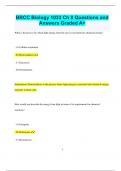
-
BRCC Biology 1033 Ch 8 Questions and Answers Graded A+
- Exam (elaborations) • 9 pages • 2024
- Available in package deal
-
- $9.99
- + learn more
BRCC Biology 1033 Ch 8 Questions and Answers Graded A+ What is the process by which light energy from the sun is converted into chemical energy? - A) Cellular respiration - B) Photosynthesis - C) Glycolysis - D) Fermentation Explanation: Photosynthesis is the process where light energy is converted into chemical energy, typically in plant cells. How would you describe the energy from light in terms of its requirement for chemical reactions? - A) Exergonic - B) Endergon...
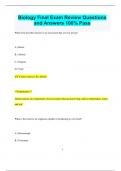
-
Biology Final Exam Review Questions and Answers 100% Pass
- Exam (elaborations) • 23 pages • 2024
-
- $9.99
- + learn more
Biology Final Exam Review Questions and Answers 100% Pass What term describes factors in an ecosystem that are non-living? A.) Biotic B.) Abiotic C.) Organic D.) Vital Correct Answer: B.) Abiotic **Explanation:** Abiotic factors are components of an ecosystem that are non-living, such as temperature, water, and soil. What is the term for an organism capable of producing its own food? A.) Heterotroph B.) Consumer 2 C.) Autotroph D.) Decomposer Correct Answer: C....
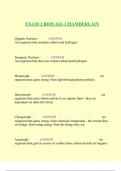
-
EXAM 2 BIOS 242- CHAMBERLAIN
- Exam (elaborations) • 21 pages • 2024
-
- $12.49
- + learn more
EXAM 2 BIOS 242- CHAMBERLAIN Organic Nutrient - ANSWER An organism that contains carbon and hydrogen Inorganic Nutrient - ANSWER An organism that does not contan carbon and hydrogen Phototroph - ANSWER An organism that gains energy from light through photosynthesis Heterotrop...
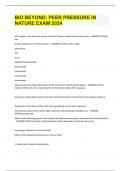
-
BIO BEYOND: PEER PRESSURE IN NATURE EXAM 2024
- Exam (elaborations) • 5 pages • 2024
-
- $16.49
- + learn more
Why should I care about the species on Earth? Choose a topic below to learn more - ANSWER ☑☑pick one Drag the Organism in the boxes below - ANSWER ☑☑From left to right green plant fish crane aligatorPhotoautotroph Heterotroph Heterotroph Heterotroph Heterotroph What do you know about the bottom of the food chain?. (Check all that apply) - ANSWER ☑☑The bottom of the food chain makes food for itself without eating other organisms Organisms at the bottom of the food c...
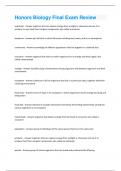
-
Honors Biology Final Exam Review Solved Correctly Questions With Solutions.
- Exam (elaborations) • 20 pages • 2024
- Available in package deal
-
- $8.39
- + learn more
autotroph - Answer-organism that can capture energy from sunlight or chemicals and use it to produce its own food from inorganic compounds; also called a producer biosphere - Answer-part of Earth in which life exists including land, water, and air or atmosphere community - Answer-assemblage of different populations that live together in a defined area consumer - Answer-organism that relies on other organisms for its energy and food supply; also called a heterotroph ecology - Answer-scienti...
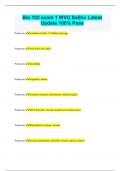
-
Bio 102 exam 1 WVU Salihu Latest Update 100% Pass
- Exam (elaborations) • 10 pages • 2024
-
Available in package deal
-
- $9.99
- + learn more
Bio 102 exam 1 WVU Salihu Latest Update 100% Pass Prokaryote evolution of cells: 3.5 billion years ago Prokaryote size of the cell: small Prokaryote unicellular Prokaryote organelles: absent Prokaryote Location of genetic information: nucleoid region Prokaryote DNA Structure: circular (usually one chromosomes) Prokaryote Reproductive strategy: asexual Prokaryote oxygen requirement: anaerobic (doesn't require oxygen) Eukaryote evolution of first cell: 1.5 billion ye...
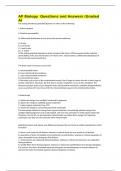
-
AP Biology Questions and Answers (Graded A)
- Exam (elaborations) • 70 pages • 2024
- Available in package deal
-
- $16.59
- + learn more
AP Biology Questions and Answers (Graded A) The resting membrane potential depends on which of the following? I. Active transport II. Selective permeability III. Differential distribution of ions across the axonal membrane A. III only B. I and II only C. II and III only D. I, II, and III D The resting potential depends on active transport (the Na+K+-ATPase pump) and the selective permeability of the axon membrane to K+ than to Na+, which leads to a differential distribution of ...
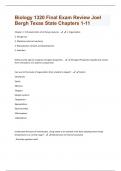
-
Biology 1320 Final Exam Review Joel Bergh Texas State Chapters 1-11 Questions And Answers With Verified Updates
- Exam (elaborations) • 33 pages • 2024
- Available in package deal
-
- $7.99
- + learn more
Chapter 1: 5 Characteristics of all living creatures - 1. Organization 2. Energy Use 3. Maintains internal constancy 4. Reproduction, Growth, and Development 5. Evolution Define and be able to recognize emergent properties. - Emergent Properties: Quality that results from interactions of a systems components Can you list the levels of organization from smallest to largest? - 1)atom 2)molecule 3)cells 4)tissues 5)organs 6)organ systems 7)organisms 8)populations 9)communities 10)ec...
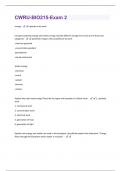
-
CWRU-BIO215-Exam 2 Questions With All Correct Answers Already Passed!!
- Exam (elaborations) • 14 pages • 2024
- Available in package deal
-
- $7.99
- + learn more
energy - capacity to do work Compare potential energy and kinetic energy. Classify different energy forms into one of these two categories - potential energy is the possibility to do work: -chemical potential -concentration gradient -gravitational -stored mechanical kinetic energy -electrical -sound -radiant -thermal -motion Explain why cells need energy? Describe the types and examples of cellular work. - 1. synthetic work 2. mechanical work 3. concentration work 4. electrical ...
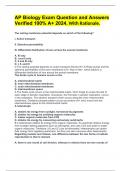
-
AP Biology Exam Question and Answers Verified 100% A+ 2024, With Rationale.
- Exam (elaborations) • 82 pages • 2024
- Available in package deal
-
- $21.49
- + learn more
AP Biology Exam Question and Answers Verified 100% A+ 2024, With Rationale. The resting membrane potential depends on which of the following? I. Active transport II. Selective permeability III. Differential distribution of ions across the axonal membrane A. III only B. I and II only C. II and III only D. I, II, and III D The resting potential depends on active transport (the Na+K+-ATPase pump) and the selective permeability of the axon membrane to K+ than to Na+, which leads t...

Do you wonder why so many students wear nice clothes, have money to spare and enjoy tons of free time? Well, they sell on Stuvia! Imagine your study notes being downloaded a dozen times for $15 each. Every. Single. Day. Discover all about earning on Stuvia


